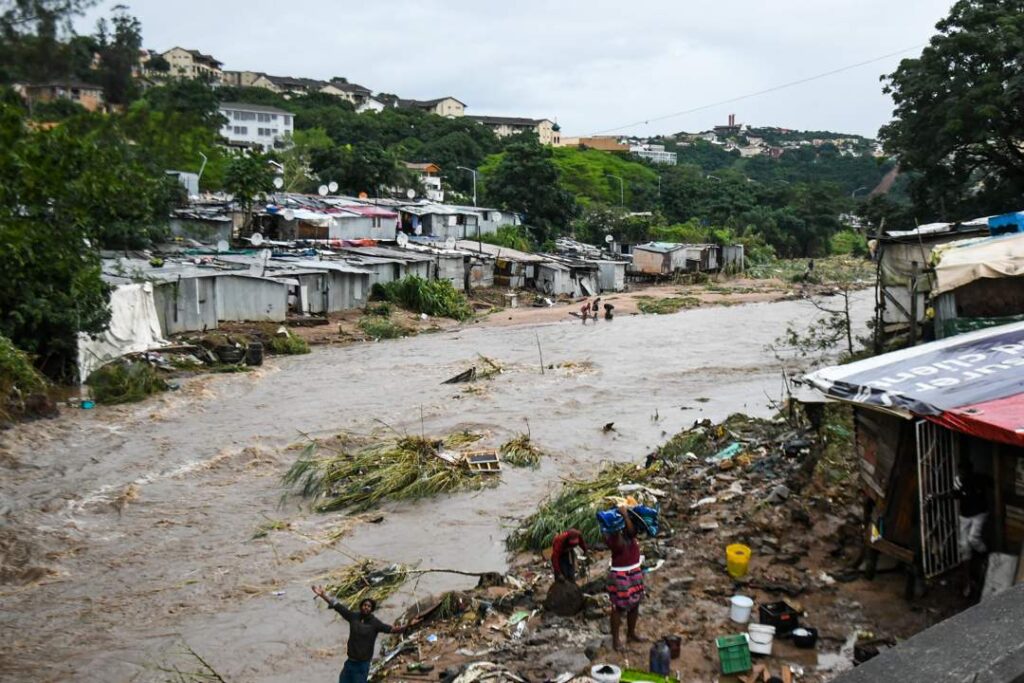
The April 2022 floods in KwaZulu-Natal were some of the most severe on record, and were at least partly attributed to climate change.
Darren Stewart/Gallo Images
South African researchers, insurers and farmers now have access to a free climate index – drilling down into climate changes from the national to the municipal level.
The index, developed for the Actuarial Society of South Africa (ASSA) by a multidisciplinary team of actuaries and meteorologists, enables users to measure the frequency of specific extreme weather events against a 30-year base period. It is currently updated to August 2025 and will be updated quarterly.
The ASSA Climate Index is free to use, thanks to funding by Old Mutual Insure.
Climate change is increasingly being highlighted as a risk, not only for farmers, but also for short-term insurers and ordinary people paying increasingly higher insurance premiums because of it.
In recent years, extensive flooding in KwaZulu-Natal has been at least partly attributed to it. The floods of April 2022 caused R54 billion in damages, of which R27 billion was covered by insurance companies. SA’s biggest insurer, Santam, paid out R4.3 billion for the one event. The company has since started using spatial data to determine the risk of a given location more accurately. Old Mutual Insure itself uses satellite data and artificial intelligence tools to determine risks, from wildfires to flooding.
In a statement, Professor Rendani Mbuvha, actuary and lead developer of the ASSA Climate Index, says the index aimed to facilitate informed risk management by insurers, medical aid schemes, policymakers, and anyone likely to suffer losses as a result of changing climate patterns.
“We hope this becomes a widely used tool to support climate-aware decisions at different insurers and financial institutions, and perhaps even outside of financial services. Actuaries, policymakers, researchers, and anyone interested in analysing and comparing different data sets will benefit from using the index, which offers users insights into climate trends across South Africa and their potential impacts on various sectors.”
The World Meteorological Organisation declared 2024 the hottest year on record, following 10 consecutive years of exceptional land and sea surface temperatures driven by human-generated greenhouse gas emissions. Mbuvha says South Africa’s short-term insurers are already incurring losses due to drought, floods, and fires caused by increasing climate variability.
He adds that during the testing phase of the index, the loss history from two large short-term insurers was compared to data provided by the index, showing a direct correlation between loss events and extreme weather patterns.
“These short-term insurers are now able to use the index to get an indication of whether there is an increase in the frequency of the extreme weather events in specific parts of the country that are likely to result in future losses. Not only will this enable insurers to price future losses, but with this data, they will also be able to create awareness among communities most likely to be affected.”
Mbuvha said the index would also be able to provide valuable insights to medical aid schemes and health insurers. He said medical aid schemes could, for example, overlay their own data over climate data from the index to identify patterns such as the correlation between weather events and utilisation rates of healthcare services during periods of extreme heat or cold.
“Climate research in the field of healthcare is interesting and likely to render insights that could help improve healthcare for communities,” said Mbuvha.
He added that, similarly, government, civil society organisations and farming communities would also be able to use the index to understand changing weather patterns and predict an increase in the frequency of extreme events likely to cause losses.
“We already have firsthand experience of the devastating impact of climate change in South Africa, but until now, we had no idea of whether the frequency is increasing. The ASSA Climate Index changes this. We are excited, because the launch of the index also marks the first stepping stone to providing an industry standard for evaluating climate extremes.”
The launch version of the Climate Index allows users to track the following data from January 1981 to the end of August 2025:
- unusually high or low temperatures;
- unusually heavy rainfall;
- severity and duration of drought periods; and
- Composite Index, a holistic measure that integrates all individual components to provide an overall climate extremity score.
According to Mbuvha, there are ambitious plans for the climate index, which include collaborations with insurers to align the index with claims experience. He is also hoping to expand the index to include predictive scenarios and broader geographical coverage across other African countries.












